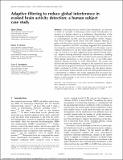Adaptive filtering to reduce global interference in evoked brain activity detection: a human subject case study
Author(s)
Zhang, Quan; Brown, Emery N.; Strangman, Gary E.
DownloadZhang-2007-Adaptive filtering t.pdf (773.5Kb)
PUBLISHER_POLICY
Publisher Policy
Article is made available in accordance with the publisher's policy and may be subject to US copyright law. Please refer to the publisher's site for terms of use.
Terms of use
Metadata
Show full item recordAbstract
Following previous Monte Carlo simulations, we describe in detail an example of detecting evoked visual hemodynamic responses in a human subject as a preliminary demonstration of the novel global interference cancellation technology. The raw time series of oxyhemoglobin (O[subscript 2]Hb) and deoxyhemoglobin (HHb) changes, their block averaged results before and after adaptive filtering, together with the power spectral density analysis are presented. Simultaneous respiration and EKG recordings suggested that spontaneous low-frequency oscillation and cardiac activity were the major sources of global interference in our test. When global interference dominates (e.g., for O[subscript 2]Hb in our data, judged by power spectral density analysis), adaptive filtering effectively reduced this interference, doubling the contrast-to-noise ratio (CNR) for evoked visual response detection. When global interference is not obvious (e.g., in our HHb data), adaptive filtering provided no CNR improvement. The results also showed that the hemodynamic changes in the superficial layers and the estimated total global interference in the target measurement were highly correlated (r = 0.96), which explains why this global interference cancellation method should work well when global interference is dominating. In addition, the results suggested that association between the superficial layer hemodynamics and the total global interference is time-varying.
Date issued
2007-11Department
Harvard University--MIT Division of Health Sciences and Technology; Massachusetts Institute of Technology. Department of Brain and Cognitive SciencesJournal
Journal of Biomedical Optics
Publisher
SPIE
Citation
Zhang, Quan, Emery N. Brown, and Gary E. Strangman. “Adaptive Filtering to Reduce Global Interference in Evoked Brain Activity Detection: a Human Subject Case Study.” Journal of Biomedical Optics 12, no. 6 (2007): 064009. © 2007 Society of Photo-Optical Instrumentation Engineers
Version: Final published version
ISSN
10833668
1560-2281